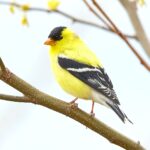Understanding Avian Respiratory Systems
First and foremost, before diving deep into the complexities, it’s pivotal to have a basic grasp of the bird’s respiratory system. Think of it as trying to understand a new piece of machinery; you’d want to know its parts and their functions.
Before we flap into the nitty-gritty, let’s do a quick fly-by of bird anatomy. Birds, those majestic beings of the sky, have evolved a unique respiratory system that sets them apart from most mammals.
How It Differs from Mammals
You see, birds don’t breathe like us. Their system is more efficient. While humans inhale oxygen-rich air and exhale carbon dioxide-rich air, birds take it up a notch. A bird’s lungs transfer oxygen during both inhalation and exhalation. Clever, right? This intricate system allows them to receive a steady supply of fresh oxygen irrespective of whether they’re inhaling or exhaling. Imagine running a marathon without panting—that’s how efficient it is!
The Role of Air Sacs
Birds come equipped with air sacs. These aren’t like our air bags, but they assist in the respiration process. Located strategically throughout their bodies, these sacs ensure that the air flows in one direction through the lungs, making sure every tweet and chirp is powered with pristine oxygen. These air sacs don’t participate directly in the oxygenation of the blood, but they act as reservoirs, ensuring a smooth and uninterrupted flow of air, maximizing the efficiency of every breath.
Factors Affecting Breathing
Everything from altitude to temperature can affect how your birdie breathes. Just as humans find it challenging to breathe at higher altitudes due to reduced oxygen levels, birds might also have to work a bit harder. Seasonal changes, sudden temperature fluctuations, or even relocating their cage can influence their respiratory rate. Understanding these nuances can give you the edge in early detection of potential issues.
Why It Matters
Why all this fuss about bird breathing? Because understanding is the first step in care. Spotting a breathing issue early means quicker treatment. It’s that simple. You wouldn’t want any harm befalling your feathery friend, would you? Ensuring their respiratory health not only adds to their lifespan but also ensures they remain active, chirpy, and happy—a delight for any bird parent!
Top Signs Your Bird Might Have Breathing Issues
Now, to the core of our topic. Just like a child, your bird won’t tell you when it’s feeling under the weather. However, certain signs might hint at underlying respiratory issues.
Tail Bobbing
While birds have their own set of quirks and behaviors, excessive tail bobbing, especially when it seems in sync with their breathing, could be an indicator of distress. Notice some funky tail movements when they breathe? This could be a sign! It’s their little way of showing that they’re exerting more effort to breathe than usual.
Open-beak Breathing
Often, when a bird is struggling to get adequate oxygen, it might resort to open-beak breathing. If your birdie’s beak is open and it’s not mid-song or during a particularly hot day, it’s time to be vigilant. It’s akin to us gasping for breath after a run.
Change in Voice
For creatures that communicate mainly through chirps and songs, any change in their voice is a red flag. A raspy chirp, a muted whistle, or even a change in the frequency of their songs might indicate a throat or respiratory issue. Time to pay attention and maybe schedule that vet visit.
Coughing or Sneezing
Yes, birds sneeze, and it’s as adorable as it sounds! But if the sneezing is more frequent than usual, or if it’s accompanied by a cough, it’s a clear indication that something’s amiss. Birds sneeze to clear out dust or foreign particles, but frequent sneezing might be a red flag for respiratory infections or allergies.
Potential Causes of Breathing Problems
Now that we’ve highlighted the signs, let’s delve deeper into understanding the potential causes behind these indicators. After all, a well-informed bird parent is a prepared one!
Infections
Just as we humans are susceptible to flus and colds, birds aren’t exempt from respiratory infections. Factors like bacteria, fungi, or viruses can infiltrate their system. Respiratory infections in birds can manifest through symptoms like nasal discharge, wheezing, or even that odd change in voice we discussed earlier. These infections can be a common culprit behind breathing challenges, so it’s always prudent to be on the lookout.
Allergies
You might be surprised, but birds can have allergies too! Just as some humans sneeze at the mere whiff of pollen or dust, birds can exhibit allergic reactions to these and more. Common irritants include pollen, dust, certain chemicals, or even certain foods. An allergic bird might showcase symptoms like sneezing, itching, or even watery eyes. Being aware of what’s in your bird’s environment can be crucial in pinpointing potential allergens.
Environmental Factors
Birds, with their delicate respiratory systems, are highly sensitive to their environment. Smoke from cigarettes or even a stray whiff from that kitchen mishap, scented candles, air fresheners, and pollutants can significantly affect your bird’s breathing. These environmental pollutants might not always cause direct harm, but over time, they can irritate the bird’s respiratory tract, leading to potential issues.
Foreign Objects
Curiosity didn’t just kill the cat; it sometimes troubles the bird too. Birds, especially the playful ones, have a penchant for picking up small objects, be it toy beads, bits of their toys, or even food chunks. When ingested or inhaled, these foreign objects can cause blockages, leading to visible distress in the bird. Always ensure that their play area is free from tiny objects that they might be tempted to pick up!
Prevention is Better than Cure
We’ve all heard the adage, and it applies in full force when dealing with our feathery friends. Proactive measures can save both you and your bird a lot of distress in the long run.
Regular Vet Visits
Don’t wait for a sign or symptom. Just as we need our regular health check-ups, our birds do too. Schedule regular vet visits to ensure your bird’s health is in tiptop shape. A vet can often spot potential issues before they become major problems, ensuring your bird remains healthy and happy.
Clean Living Space
A bird’s cage is its castle. And just as we wouldn’t like to live in a dirty home, neither do they. Ensure cages are clean and free from droppings, leftover food, and any potential foreign objects. A dirty cage can be a breeding ground for diseases, so regular cleaning is a must!
Air Purifiers
Considering the sensitivity of a bird’s respiratory system, investing in an air purifier can be a wise choice. These devices can help keep the air fresh, reducing potential irritants and ensuring your bird breathes easy. However, when choosing one, ensure it’s safe for birds—some air purifiers can emit fumes that are harmful to them.
Dietary Checks
Just as we watch what we eat, keeping a check on your bird’s diet can be crucial. Ensure your bird’s diet is nutritious, balanced, and free from potential allergens. Introducing new foods should be done gradually, monitoring the bird for any adverse reactions.
When to Seek Professional Help
As much as we love to believe we have everything under control, sometimes, situations call for an expert’s touch. Birds, with their delicate constitutions, often require prompt professional care when things seem amiss.
Persistent Symptoms
While an occasional sneeze or a few hours of changed behavior can be brushed off, symptoms that persist are a cause for concern. If you observe that your bird’s symptoms last for more than a day, it’s a clear signal that you need to get them checked out. Waiting for a symptom to worsen can lead to further complications, and in the world of our feathered friends, time is often of the essence.
Lethargy
Birds are generally active creatures, always on the move, always curious, and ever playful. If your chirpy friend, who usually can’t stay still, suddenly becomes sluggish or shows a marked decrease in activity levels, it’s an immediate cause for concern. Lethargy can be a sign of many underlying issues, including breathing problems.
Loss of Appetite
Feeding time is usually a joyous occasion, with the bird eagerly pecking at their favorite seeds or treats. A sudden loss of appetite, especially towards their favorite foods, can be indicative of distress or health problems. Birds rely on their food not just for energy but also for hydration, so any disruption in their feeding patterns should be addressed swiftly.
Physical Distress
Visible signs of distress, such as ruffled feathers, constant wing flapping without flight, or an awkward posture, are red flags. If your bird seems to be in pain, is struggling, or shows any other signs of physical discomfort, it’s imperative to rush them to a vet. Breathing issues, especially, can escalate rapidly, so any indication of such problems should be taken seriously.
Conclusion
Caring for a bird is a joy like no other. Their songs, their antics, and their vibrant personalities can light up a home. But, with the pleasure of their company comes the responsibility of their well-being. Being a vigilant guardian, knowing the signs of distress, understanding the potential causes, and being proactive in prevention are the keys to ensuring your feathery friend leads a happy, healthy life. So, armed with knowledge and brimming with love, let’s make sure our birds keep singing their heartful tunes for years to come.
FAQs
1. Can birds catch colds from humans?
It’s a common myth that birds can catch human colds, but the truth is, they cannot. However, they have their unique set of respiratory issues and illnesses. So, while your sneeze won’t give your parakeet a cold, it’s always good to maintain hygiene and ensure a clean environment for them.
2. How often should I clean my bird’s cage?
Cleanliness is next to birdie happiness! A thorough cleaning once a week ensures a hygienic environment. However, daily spot cleaning, like removing waste and leftover food, can help maintain a fresher atmosphere in between those deep cleans.
3. Are scented candles harmful for birds?
Absolutely. Given the sensitivity of birds’ respiratory systems, it’s advisable to avoid strong scents, including those from scented candles, around them. Such products can release chemicals and pollutants that might be harmful or irritating to birds.
4. What’s the average lifespan of a pet bird?
The lifespan of birds varies significantly depending on the species. While some smaller birds, like canaries and finches, might live for 5–10 years, larger birds like parrots can live for decades, some even reaching ages beyond 50 years with proper care!
5. How can I tell if my bird is in pain?
Look out for changes in behavior, such as loss of appetite, lethargy, or visible distress. Birds might also exhibit physical signs, like ruffled feathers or a hunched posture. Always trust your instincts—if something feels off, it’s best to consult with a veterinarian.





